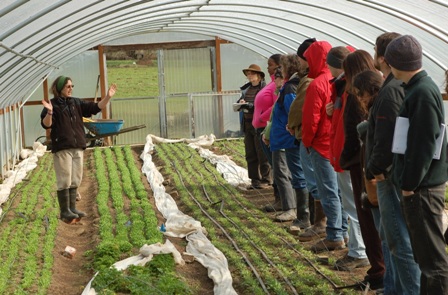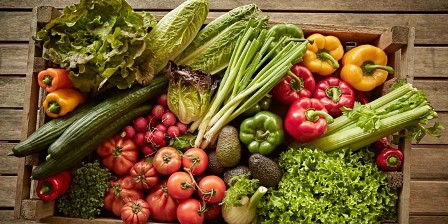
Organic Farming
Organic farming is a sustainable agricultural practice that focuses on maintaining soil health, biodiversity, and ecological balance without the use of synthetic chemicals or genetically modified organisms. It is an agricultural approach that focuses on the cultivation of crops and the rearing of livestock without the use of synthetic fertilizers, pesticides, genetically modified organisms (GMOs), and other artificial inputs. The primary goal of organic farming is to work in harmony with nature, maintaining the health of ecosystems, minimizing environmental impact, and producing healthy and sustainable food. With the growing concern for food safety and environmental sustainability, the demand for organic products has been increasing in India. This has opened up numerous career opportunities in the field of organic farming.
Role Desciption
The role of an organic farmer involves various responsibilities and tasks related to practicing and promoting organic farming methods. Organic farmers play a crucial role in producing food in an environmentally sustainable and socially responsible manner. Here's a comprehensive role description for organic farmers:
- Crop and Livestock Management:
- Plan, manage, and oversee the cultivation of crops and rearing of livestock using organic methods.
- Implement practices like crop rotation, cover cropping, companion planting, and integrated pest management to maintain soil fertility and control pests and diseases.
- Ensure the well-being and humane treatment of animals, if involved in livestock farming, by providing appropriate housing, nutrition, and access to outdoor areas.
- Soil Health and Fertility:
- Monitor soil health and fertility levels through regular soil testing and observation.
- Prepare and apply organic compost, manure, and other natural amendments to enrich the soil with nutrients and organic matter.
- Implement practices to prevent soil erosion, improve soil structure, and enhance microbial activity.
- Pest and Disease Management:
- Implement natural pest control methods such as introducing beneficial insects, using traps, and practicing crop diversity to minimize the impact of pests.
- Monitor crops for signs of diseases and implement preventive measures like proper spacing, sanitation, and early intervention to manage disease outbreaks.
- Biodiversity and Ecosystem Management:
- Foster biodiversity on the farm by planting a variety of crops, encouraging native plants, and providing habitats for beneficial insects and wildlife.
- Implement conservation practices to protect natural resources, including water bodies, wetlands, and forests, that may exist on the farm.
- Equipment and Infrastructure:
- Maintain and manage farm equipment, tools, and infrastructure required for planting, cultivating, and harvesting crops.
- Ensure that machinery and tools are properly maintained and used safely
- Market and Community Engagement:
- Market and sell organic products, either directly to consumers through farmers' markets or via partnerships with local retailers and restaurants.
- Educate the community about the benefits of organic farming, sustainable agriculture, and the importance of supporting local food systems.
- Adaptation to Local Conditions:
- Tailor organic farming practices to suit the specific climate, soil type, and local ecosystem of the farm's location.
- Tailor organic farming practices to suit the specific climate, soil type, and local ecosystem of the farm's location.
- Advocacy and Outreach:
- Advocate for policies that support organic farming, environmental protection, and sustainable food systems at local, regional, and national levels.
- Advocate for policies that support organic farming, environmental protection, and sustainable food systems at local, regional, and national levels.
Eligibility
Route to become an organic farmer
- 10+2 with PCB
- B.Sc. Ag. / Horti./Forestry or B.Sc. (Hons.) Agriculture/ Horticulture/ Forestry
- M. Sc Organic Farming
Significant stats
Organic farms have to go through rigorous certification processes. A certain amount of fee is also required to get the certification. It is essential to comply with organic standards. In case of failure to meet these standards, organic farms have to face the ramifications.
Pros/Cons
PROS
- Organic crops are much in demand, hence it is a lucrative career option.
- Input cost is less but sale price is much higher than conventional agriculture crops, so huge profit margins are there.
- There is good scope for export business in organic produce.
CONS
- Output is less as compared to conventional agriculture which may put pressure on profit margins.
- Organic products have a shorter shelf life making careers in this field highly risky.
Leading Professions
View All
Organic Farmer
Organic farmers are at t...
5.0LPA

Organic Farm Manager
Farm managers oversee th...
6.0LPA

Agricultural Consultant
Agricultural consultants...
12.0LPA

Agroecologist
Agroecologists focus on ...
4.0LPA

Certification Specialist
Certification specialist...
10.0LPA

Sustainable Agriculture Educator
Educators in sustainable...
4.0LPA

Organic Food Inspector
Organic food inspectors ...
3.0LPA

Research Scientist (Organic Agriculture)
Research scientists focu...
12.0LPA
CAREER VIDEOS
Career Path
10+2 with science with Biology
1 Steps
Skills
Recruitment Area
Organic farms ,
Research and development ,
Certification and inspection agencies ,
Non-governmental organizations (NGOs) ,
Government departments .
Recruiters
Sahaja Samrudha Organic Producer Company Ltd. ,
24 Mantra Organic ,
Organic India Pvt. Ltd. ,
Jaivik Bharat ,
Navdanya ,
Hariyale .
Explore Colleges
Exams & Tests
Interested? Take the next step for this career
10+2 with science with Biology
- 1 Steps
Skills Needed
Exams and Tests
Recruitment Area
Organic farms ,
Research and development ,
Certification and inspection agencies ,
Non-governmental organizations (NGOs) ,
Government departments .
Recruiters
Sahaja Samrudha Organic Producer Company Ltd. ,
24 Mantra Organic ,
Organic India Pvt. Ltd. ,
Jaivik Bharat ,
Navdanya ,
Hariyale .



















